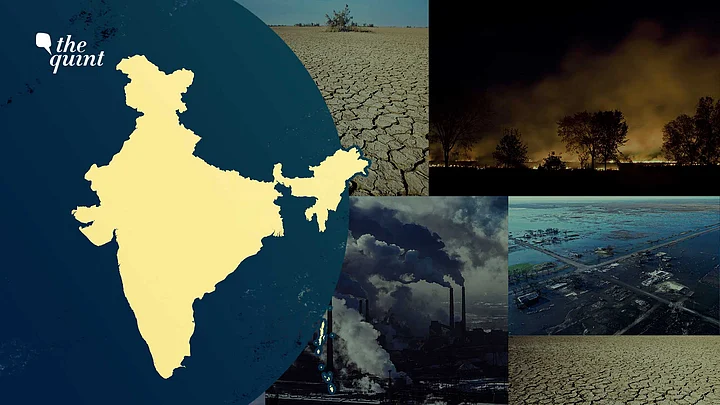About 70 percent of Indian citizens are worried about the state of nature and over 90 percent feel that they should do more to protect it, says a new international survey, conducted across G20 countries.
The survey by IPSOS Mori and the Global Commons Alliance, called 'The Global Commons Survey: Attitudes to Planetary Stewardship And Transformation Among G20 Countries' comes shortly after the "code-red" report by the United Nation's Intergovernmental Panel On Climate Change (IPCC) which predicted an unprecedented rise in global temperatures in the next few decades.
The survey gives detailed data on public attitude in G20 countries towards climate tipping points, planetary stewardship and necessary economic and societal transformations to curtail the effects of climate change.
What Indians Think About Climate Change
According to the survey, 77 percent of the Indians surveyed recognise that the Earth is close to a climate tipping point. Moreover, 70 percent of the respondents from India were worried about the state of nature and natural resources as they are today.
The most important finding of the survey, however, is that a large percentage of Indian citizens care about nature and the climate and want to do more to protect it.
The report says that 90 percent of Indians surveyed felt that they would like to do more to protect nature and stymie the effects of climate change. Moreover, 78 percent believed that the benefits of protecting nature outweigh the costs.
The survey also throws light on another important aspect of climate policy in India - that of affordable, climate-compatible lifestyle choices.
An oft-stated argument on Indian climate policy is that environmentally-friendly lifestyle choices are most often too expensive or novel for the marginalised masses.
In this regard, the survey says that 35 percent of Indian respondents felt that affordability is the biggest barrier to climate action.
However, 77 percent of the respondents said that they'd support a move towards a "well-being economy" that prioritises human well-being and sustainable use of natural resources, rather than one that singularly focusses on economic growth.
79 percent also said that the COVID-19 pandemic was a unique opportunity to transform society in a manner such that it becomes more resilient to shocks - those pertaining to climate and otherwise.
Moreover, 76 percent felt that the UN should be given more power to protect the global commons i.e. the earth's shared natural resources like oceans, air, atmosphere etc.
People In Developing Countries Show Greater Willingness To Protect Nature
The survey also presents a larger picture on how people across G20 countries feel about the current state of nature, protection of global commons, and sustainable, eco-friendly economic development.
Interestingly, the survey states that people in developing countries showed greater willingness to do more to protect nature and the climate than those in advanced economies.
This finding is important when juxtaposed with the findings of the IPPC's recently released Sixth Assessment Report. The report stated that greenhouse emissions solely from human activities are responsible for an approximately 1.1°C rise in global temperatures from pre-industrial levels between 1850-1900. This is the time when now developed countries were industrialising. Countries which are developing now, like India, therefore argue that developed countries must take greater action to fix the climate and "clear emission space" so that developing countries can grow their economy.
According to the findings of the survey, 95 percent of respondents from Indonesia, 94 percent from South Africa and 93 percent from China showed willingness to do more for the environment as compared to 61 percent of respondents from Japan, 70 percent from Germany and 74 percent from the United States.
However, 83 percent of the respondents across G20 countries said that they were willing to do more to become better “planetary stewards”.
73 percent of the total respondents also said that their country's economy should move beyond a singular focus on profit and economic growth, and focus more on human well-being, ecological protection and regeneration.
73 percent of the respondents also believed that the Earth is approaching potentially abrupt or irreversible tipping points because of human action, with 58 percent being "extremely worried" about the state of global commons.
“The world is not sleepwalking towards catastrophe. People know we are taking colossal risks, they want to do more and they want their governments to do more,” said Owen Gaffney, the lead author of the report.
“The findings should provide G20 leaders with the confidence to move faster to implement more ambitious policies to protect and regenerate our global commons", he added.
However, the survey revealed that people are less aware of the scientific consensus that sweeping systemic changes are needed in the next decade to protect the global commons and meet climate targets set out in the UN’s Paris Agreement.
While 59 percent of people in G20 countries know that, scientifically, a very rapid energy transition - from fossil fuels to renewable energy - is needed in the next decade, just 8 percent of people acknowledge that there's a need for broader economic changes which include things like dietary changes and adjusting prices of goods and services to include environmental costs.
“This is worrying. We need high-profile, high-impact public information campaigns to show the speed and scale of transformation required to protect the global commons. This is beyond an energy transition: it’s an everything transition. While people need to prepare for disruption, the benefits to everyday life need greater emphasis. These benefits include more jobs, living in cities with low pollution, healthier diets, greater societal trust, political stability and greater wellbeing for all", Gaffney said.
The survey was carried out by IPSOS Mori in April and May 2021 – before the release of the IPCC’s Sixth Assessment Report. It was conducted across G20 countries with 19,735 people surveyed.
